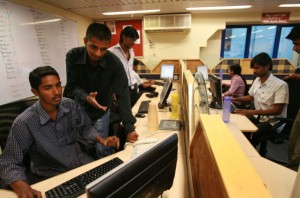

Follow us on:  
|


India believe a sectoral pact on IT could damage their domestic market. [Getty Images]
With negotiations at the Doha Round of talks stalled for over a decade, a group of developed countries have taken a detour and are urging India, among other developing countries, to accept four major sectoral pacts – trade facilitation (TF), information technology (IT), environmental goods and international services agreement.
A sectoral pact is often used to bypass persistent trade obstacles because its limited coverage minimises spillover to other areas of trade.
However, according to The Dynamics of North American Trade and Investment: Canada, Mexico and the United States, a sectoral approach “complicates the negotiation of trade reforms because it is difficult to balance concessions within a specific product sector or between a few sectors”.
This appears to be India’s main stumbling block. India’s news agency PTI quoted a government official on Sunday as saying New Delhi would study the details of the TF and international services agreement pacts, but would reject any sectoral pact on IT and environmental good because these would negatively impact domestic markets.
The official was quoted as saying developed countries like the US and EU are “cherry picking” sectors where they maintain a considerable advantage.
Economic experts say that sectoral pacts are preferential and that such exclusivity ultimately undermines the Doha Round and adversely affects developing countries such as BRICS.
Only signatories benefit from the sectoral pacts; fellow members states in the WTO do not benefit.
Simon Evenett, a professor of international trade at St. Gallen University in Switzerland, told Reuters that sectoral pacts and regional deals would benefit big business. “It would do nothing to assuage developing countries wanting a fairer deal on agriculture or better access to rich markets for their exports and services,” Reuters reported on Sunday.
India’s position comes amidst finger-pointing between developing and developed countries over responsibility for stalling the Doha Round.
Last week, India rejected media reports that it was leading developing countries to demand significant concessions to agree to a global trade deal.
Source: Agencies